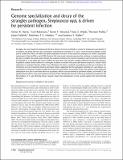Genome specialization and decay of the strangles pathogen, Streptococcus equi, is driven by persistent infection
Abstract
Strangles, the most frequently diagnosed infectious disease of horses worldwide, is caused by Streptococcus equi. Despite its prevalence, the global diversity and mechanisms underlying the evolution of S. equi as a host-restricted pathogen remain poorly understood. Here we define the global population structure of this important pathogen and reveal a population replacement in the late 19th or early 20th century. Our data reveal a dynamic genome that continues to mutate and decay, but also to amplify and acquire genes despite the organism having lost its natural competence and become host-restricted. The lifestyle of S. equi within the horse is defined by short-term acute disease, strangles, followed by long-term carriage. Population analysis reveals evidence of convergent evolution in isolates from post-acute disease samples, as a result of niche adaptation to persistent carriage within a host. Mutations that lead to metabolic streamlining and the loss of virulence determinants are more frequently found in carriage isolates, suggesting that the pathogenic potential of S. equi reduces as a consequence of long term residency within the horse post-acute disease. An example of this is the deletion of the equibactin siderophore locus that is associated with iron acquisition, which occurs exclusively in carrier isolates, and renders S. equi significantly less able to cause acute disease in the natural host. We identify several loci that may similarly be required for the full virulence of S. equi, directing future research towards the development of new vaccines against this host-restricted pathogen.
Citation
Harris , S R , Robinson , C , Steward , K F , Webb , K S , Paillot , R , Parkhill , J , Holden , M T G & Waller , A S 2015 , ' Genome specialization and decay of the strangles pathogen, Streptococcus equi , is driven by persistent infection ' , Genome Research , vol. 25 , no. 9 , pp. 1360-1371 . https://doi.org/10.1101/gr.189803.115
Publication
Genome Research
Status
Peer reviewed
ISSN
1088-9051Type
Journal article
Description
The authors would like to thank the Horserace Betting Levy Board for funding the analysis of the eqbE mutant (ref: Vet/prj/758). The Horse Trust funded the collection of isolates from UK outbreaks of strangles (G1606). We thank the core sequencing and informatics teams at the Sanger Institute for their assistance and The Wellcome Trust for its support of the Sanger Institute Pathogen Genomics and Biology groups. SRH, JP and MTGH were supported by Wellcome Trust grant 098051.Collections
Items in the St Andrews Research Repository are protected by copyright, with all rights reserved, unless otherwise indicated.

